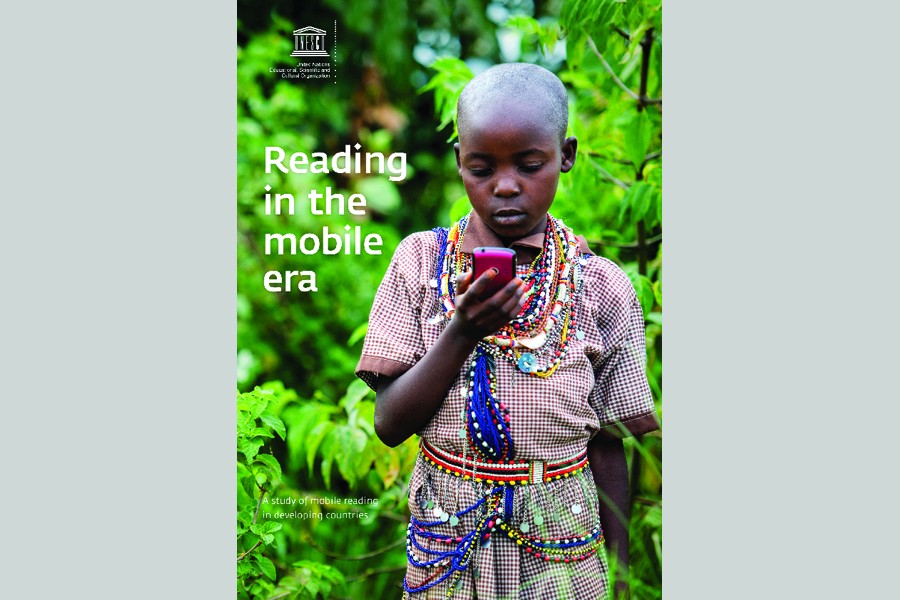Reading in the Mobile Era: A Study of Mobile Reading in Developing Countries
Published by UNESCO
Pages 87, ISBN 978-92-3-100023-2
"I actually read more on my mobile than I used to. I think it is because I can carry my phone everywhere I go and it is quite easier than carrying a book, and it is always there when I want to read." (Tinashe, a student of Human Resource Management from Zimbabwe)
In today's fast-moving and globalised world, we can hardly imagine a day without mobile phones. One of the most successful inventions of the 20th century, the mobile phone has become a convenient means of communication in both developed and developing countries. The United Nations estimates that 6 billion people across the world now have access to a working mobile phone. Due to the ubiquity of mobile devices, they can be leveraged to advance literacy and reading in underserved communities around the world. The UNESCO publication 'Reading in the Mobile Era: A Study of Mobile Reading in Developing Countries' explains the habits, preferences and demographic profiles of mobile readers in developing countries. By painting a picture of how mobile reading is practised today and by whom, it offers insights into how mobile technology can be used to better facilitate reading in countries where literacy rates are low. The book also highlights current opportunities and challenges related to mobile reading, in order to inform about the work of various stakeholders wanting to use mobile devices to increase reading on a large scale.
Based on a study conducted in seven developing countries (Ethiopia, Ghana, India, Nigeria, Pakistan, Uganda and Zimbabwe), the book states that in absolute numbers, mobile readers are predominantly male. However, female users greatly outnumber males at higher level of usage, and female mobile readers spend significantly more time reading per month than males. Although people of various ages use mobile technology to access long-form reading material, mobile readers are typically young. Older people were noticeably absent from the survey data. Mobile readers tend to be more educated than the general population, and female mobile readers are more educated than males. The most active mobile readers are those who have achieved a diploma but have not completed a higher education degree such as a bachelor's, Master's or PhD. Interestingly, mobile readers with higher education degrees are not the most active users, presumably because they have alternative channels through which to access reading material.
Originally, it was hypothesised that people read on mobile phones because they lacked access to paper books and stories. The study indicates that, overwhelmingly, convenience ranks as the main reason people read on mobile devices in developing countries. Secondary reasons include affordability, a preference for mobile reading over paper books, and lack of access to paper materials. The study also aims at examining mobile readers' reading habits revealing two key trends: 1) Mobile readers read more than they did prior to reading on their phones, and 2) Mobile readers are reading books and stories to children from their mobile phones. The findings clearly indicate that mobile reading is opening up a new pathway to literacy for children. Findings also show that mobile readers favour genres related to romance, education and religion, and that many mobile readers are also interested in content published in local languages. The largest obstacle to mobile reading is not cost but content, followed closely by connectivity issues.
Mobile reading opens up new pathways to literacy for marginalised groups, particularly women and girls, and others who may not have access to paper books. Moreover, mobile phones hold promise for improving female literacy, particularly in areas where paper books are inaccessible to women due to cost, scarcity or social stigma against female education. In order to better reach these target groups this study suggests for adopting three broad strategies to extend the benefits of mobile reading to more people: 1) diversify mobile reading content and portals to appeal to specific target groups; 2) increase outreach efforts to create opportunities for potential users to experiment with mobile reading and learn about its benefits; and 3) ensure lower cost and remove technology barriers to mobile reading. Evidence presented in this book strongly indicates that the benefits of mobile reading are long-lasting and far-reaching, with the potential to develop literacy, increase education opportunities and change people's lives for the better. Hence, to ensure that all people have equal opportunities to access reading materials through their mobile phones, governments should continue to work with mobile phone operators to improve infrastructure and guarantee reliable mobile broadband connectivity throughout the country.
M. Rayhanul Islam is an
independent researcher.


